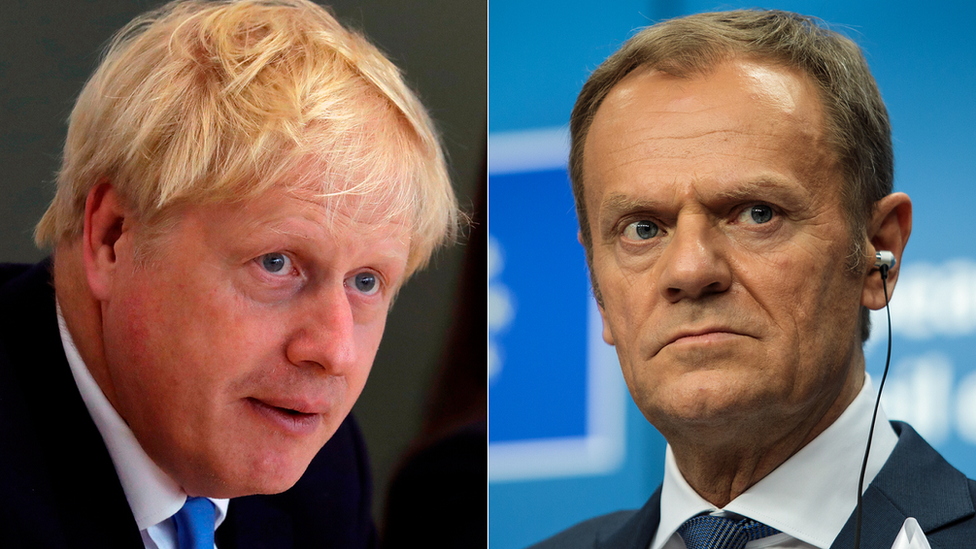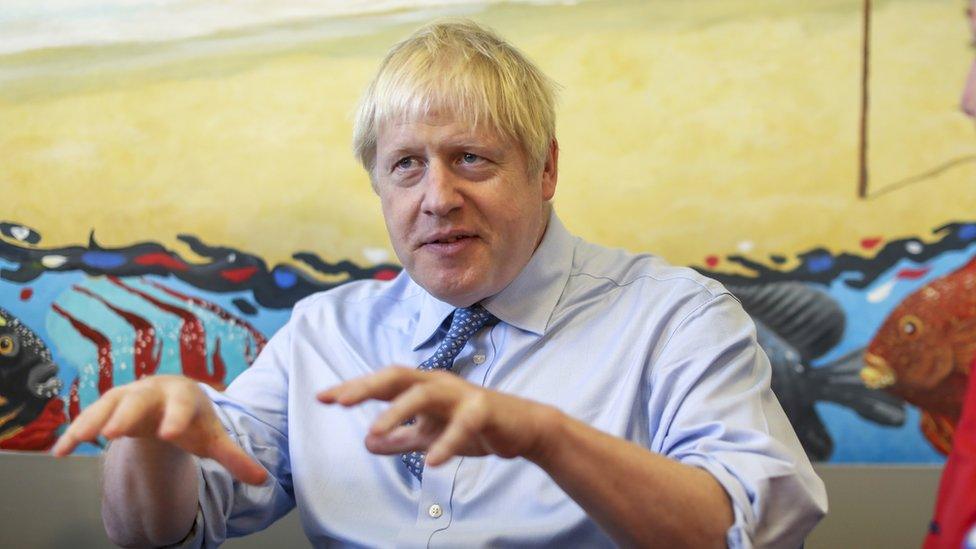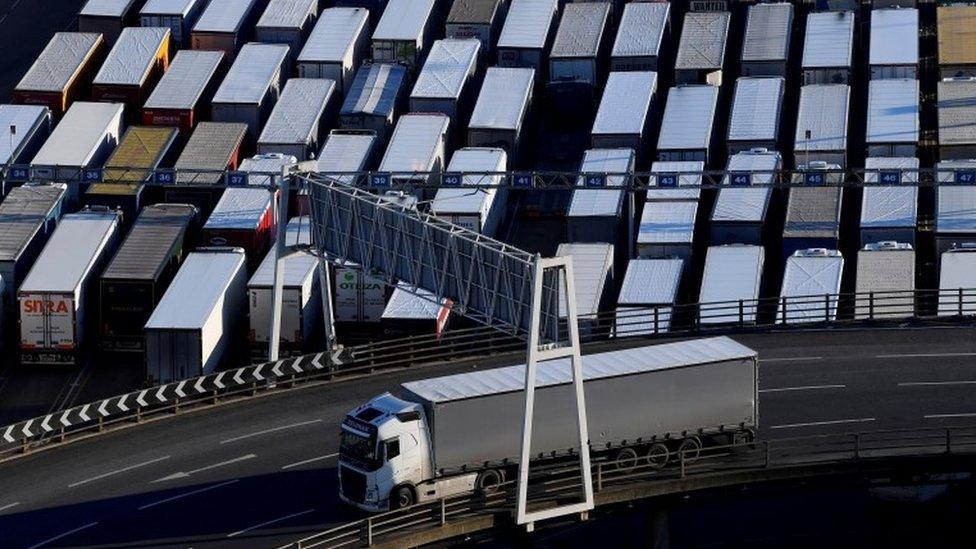Brexit: Boris Johnson says 'anti-democratic' backstop must be scrapped
- Published
- comments

Boris Johnson has written to Donald Tusk (right) to set out his demands for a Brexit deal
Boris Johnson has told the EU the Irish border backstop must be scrapped as it is "unviable" and "anti-democratic".
In a letter to European Council President Donald Tusk, external, the PM also said the backstop risked undermining the Northern Irish peace process.
But Mr Tusk said those opposing the arrangement without "realistic alternatives" supported re-establishing a hard border.
This was the reality "even if they do not admit it", he added.
"The backstop is an insurance to avoid a hard border on the island of Ireland unless and until an alternative is found," Mr Tusk tweeted., external
"This has been the clear and consistent EU position, it remains so," added Irish Foreign Minister Simon Coveney in response to the tweet.
The European Commission said Mr Johnson's letter did not contain a "legally operational solution" to prevent a hard Irish border.
"It does not set out what any alternative arrangements could be," a spokeswoman said, and "recognises that there is no guarantee such arrangements would be in place by the end of the transitional period".
The backstop is part of the withdrawal agreement, negotiated by former PM Theresa May with Brussels but rejected three times by MPs.
Mr Johnson's four-page letter to Mr Tusk came ahead of meetings this week with German Chancellor Angela Merkel and French President Emmanuel Macron.
The BBC's political correspondent Iain Watson said Mr Johnson appeared to be aiming for one of two outcomes - either the EU blinks as the prospect of no deal looms ever closer, or it holds firm, in which case the PM will argue it is Brussels' fault the country is heading for no deal.
The border is a matter of great political, security and diplomatic sensitivity, and both the UK and EU agree that whatever happens after Brexit there should be no new physical checks or infrastructure at the frontier.
The backstop is a position of last resort to guarantee that, but if implemented, it would see Northern Ireland stay aligned to some rules of the EU single market.
It would also involve a temporary single customs territory, effectively keeping the whole of the UK in the EU customs union.
Confused by Brexit jargon? Reality Check unpacks the basics.
In his letter, Mr Johnson described the backstop as "inconsistent with the sovereignty of the UK".
He said the arrangement would be "anti-democratic" because it offered no means for the UK to unilaterally exit and no say for the people of Northern Ireland over the rules that would apply there.
The PM also warned that it risked "weakening the delicate balance" of the Good Friday peace agreement because unionist parties like the DUP are so unhappy with it.
He said he was confident that its removal would lead to the withdrawal deal finally being passed in the UK Parliament.
But Guy Verhofstadt, Brexit spokesman for the European Parliament, said there was no majority in his assembly - which would also have to ratify any Brexit deal - to remove the backstop.
"It is a vital insurance policy, negotiated in good faith and supported by the people of the Island of Ireland," he tweeted, external.
Sir Jeffrey Donaldson: “There is not another country in the world with an internal customs arrangement – this is unacceptable.”
The prime minister called for "flexible and creative solutions" and "alternative arrangements" - based on technology - to avoid a hard border.
He said the backstop should be replaced with a commitment to put in place such arrangements as far as possible before the end of the transition period - currently the end of 2020 under Mrs May's deal.
If they were not in place by the end of the transition period, Mr Johnson said the UK was "ready to look constructively and flexibly at what commitments might help".
"Time is very short. But the UK is ready to move quickly, and, given the degree of common ground already, I hope the EU will be ready to do likewise," he wrote.
"I am equally confident that Parliament would be able to act rapidly if we were able to reach a satisfactory agreement which did not contain the backstop."


Donald Tusk doesn't name Boris Johnson in his tweet, but it's pretty clear he's referring to the prime minister and people of the same view.
In addition, the European Council and European Commission have sent a document to EU governments rebutting the claims in Mr Johnson's letter.
The document says the prime minister is wrong to suggest the backstop contradicts the Good Friday Agreement.
It also says he is wrong to suggest there is no way for the people of Northern Ireland to have a say, and that the separate legal orders of Northern Ireland and Ireland only coexist because of the framework provided by EU law.
The bottom line from the EU is that the backstop has to stay, because it's the only way to resolve all these problems.
In reply a senior UK government figure says Mr Tusk's response "looks like an overreaction".
"It appears their position is 'nothing will change' from the unworkable deal offered to Theresa May," they say. "Sad they are unwilling to be reasonable."

However, Labour pointed out that Mr Johnson actually voted for Mrs May's deal - including the backstop - when it came before Parliament for a third time in March.
Mr Johnson said at the time he was only doing so because he had reached the "sad conclusion" it was the only way to ensure the UK actually left the EU.
"Whichever Brexit outcome he pursues, whether it's a disastrous no deal or this fantasyland wish list, Boris Johnson clearly has no qualms about putting jobs, rights, prosperity or peace in Northern Ireland at risk," shadow Northern Ireland secretary Tony Lloyd said.
Meanwhile, Labour leader Jeremy Corbyn is calling on the government to publish all documents on the impact of a no-deal Brexit, after a leak at the weekend suggested there could be significant disruption to supplies of food and medicine.
The government insisted the Operation Yellowhammer information was out of date and Brexit planning had accelerated since Mr Johnson became PM.
Conservative Party chairman James Cleverly told the BBC on Tuesday: "What it is, it's an internal document to stimulate actions and behaviour of governments - it's not a prediction, it's not a future estimate of reality, it is a series of worst-case scenarios to be mitigated and avoided."
However, Mr Corbyn said: "If the government wants to be believed that it doesn't represent the real impact, it must publish its most recent assessments today in full."
A government spokesperson said up-to-date information on what businesses and members of the public needed to do to prepare for the UK's departure from the EU was available on the government's website.
- Published19 August 2019

- Published18 August 2019

- Published16 October 2019

- Published30 July 2019

